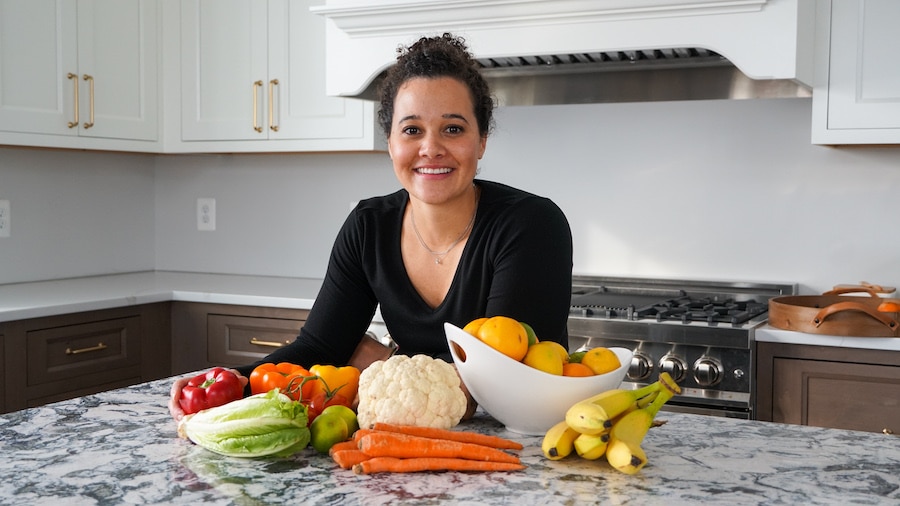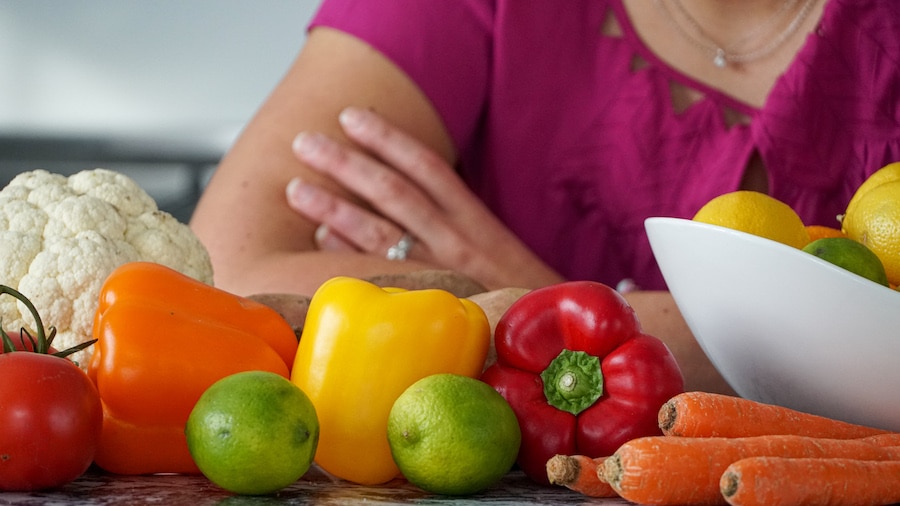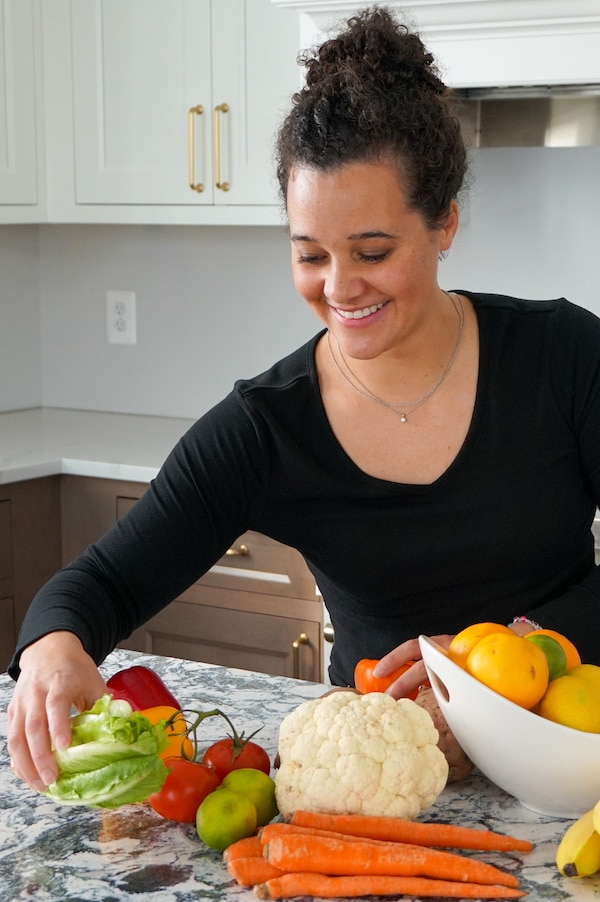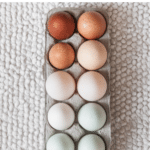Curious if you can lower cholesterol naturally? The good news is with the right knowledge you can. Registered Dietitian Ashley Reaver answers your cholesterol questions.

Hi friends! I’m bringing a guest post to you guys today from my friend Ashley, a dietitian in California who specializes in cholesterol. Knowing some of you guys might have a family history of high cholesterol, I asked if she wanted to share her expertise. Enjoy! – Kath
How To Lower Cholesterol Naturally
As I entered adulthood, I was keenly aware of my family’s history with high cholesterol.
Several members of my immediate family have elevated cholesterol levels and take medication for it. During my time at college studying nutrition, I paid special attention to the lecture on heart disease because, as a Type A hypochondriac, I fully expected that I was at a dramatically increased risk for it based on my family history.
Fast forward a few years and I had my first blood test as an adult. I checked the “family history of high cholesterol” box on my intake forms and fully expected that my doctor would tell me that I, too, suffered from the family affliction.
To my surprise, my numbers were very far from elevated. My doctor commented that I did not “inherit” the gene for high cholesterol.
As a dietitian, I knew that diet had a huge impact on cholesterol levels, but that family history hung over me like a cloud until those first results came in. I truthfully thought that if it was high then it was completely out of my control.
Over the past 10 years of counseling nutrition clients, I’ve heard the same mindset that I once had over and over again: “cardiovascular disease runs in my family,” “it’s out of my control,” “I’ll just have to go on medication.”
And while elevated cholesterol is incredibly common (it impacts 95 million Americans), it’s estimated that only 5% of those with elevated cholesterol levels actually inherited genes that impact it.
What about the other 95%? Well, inheritance might have something to do with it, just not genetic inheritance.
I talk about this more in a video with WebMD.
Does high cholesterol run in families?
While our genes, or the blueprint for how we are built, definitely run in families, we also inherit so much more than our genes from our families. We also inherit how we eat.
What constitutes a meal, our staple foods, our favorite foods, how we celebrate, and what foods we aren’t familiar with eating are all inherited, too. If you, your parents, your siblings, and your grandparents all share similarities in the diet, then it makes a lot of sense that you also share conditions largely influenced by diet, like high cholesterol, too.
If you are from a family where many others also struggle with high cholesterol or related heart health concerns, don’t throw in the towel and assume it’s out of your hands. There are things you can do since, statistically speaking, it’s not likely caused by your genes.
Can I have high cholesterol if I eat healthy?
What if you already consider your diet pretty healthy and have a healthy lifestyle but your levels are still high?
The thing about “healthy” is that it is pretty subjective. In the US, “healthy” typically means that the food won’t cause weight gain. In fact, individuals actively engaging in a lot of popular weight loss diets like keto, paleo, and low carb often do end up with elevated cholesterol because your weight is just one small fraction of your overall health.
For women in particular, there is a higher tendency to think about diets. While there are a lot of diets, the most common dieting tactics include increasing protein and cutting back on carbohydrates.
Unfortunately, these two dietary changes can directly lead to high cholesterol levels. Even in normal weight people.
This is one big misconception about cholesterol. You do not have to be “unhealthy” to have high levels. You can be a young, skinny, vegetarian getting physical activity everyday and still have high cholesterol or you can be an 85 year old couch potato with some obvious areas for improvement.
If the portion of nutrients in your diet isn’t correct, your cholesterol can still be high!
Can you lower cholesterol naturally?
The short answer is yes. You can lower your cholesterol without medication when focusing on the right things.
The focus on just dieting and weight loss as a way to improve cholesterol is not the way to go. Unfortunately, this is often the only advice many people get from their physician.
Instead of just focusing on weight loss, you need to focus on what is causing your cholesterol to be high. It all typically gets condensed down to just 2 nutrients: soluble fiber and saturated fat. A big area of overlap between the typical US diet and “clean” diets are that these nutrients aren’t in the right proportion.
Saturated fat intake tends to be too high and soluble fiber intake is way too low.
Where can you find saturated fats? Mostly from animal products, but you can also find them in high amounts in some plants! Coconut, cocoa, and palm oil all have more saturated fat than butter. Focusing on omega-3 fatty acids (from salmon or plant-sources like chia seeds) and avoiding trans fats often found in highly processed foods reduces the risk of heart disease as well.
Load up on plant foods to get your soluble fiber in!
This type of fiber is different than what you find in fruits and vegetables. Both are important, but soluble fiber is what impacts cholesterol levels. Where can you find it? A great rule of thumb is to think about whether or not a food would expand in water overnight. If it absorbs water, it’s probably a good source! Beans, grains, and some nuts and seeds are great sources.

How can I lower my cholesterol naturally?
Lowering your cholesterol does not require a super strict diet. It doesn’t require you to feel restricted and deprived.
You can keep eating your favorite foods. It’s all about the long game: finding a sustainable way of eating that lowers your levels and allows you to still enjoy your food.
And guess what? That looks different for everyone.
The biggest area to tweak can be completely different for everyone based on their usual diet. Instead of trying to change out absolutely everything at once, highlight the 2-3 changes that will have the biggest impact on your cholesterol levels.
Considering that 95 million Americans have high cholesterol, the resources for it are pretty terrible!
A quick Google search basically tells you to not eat red meat or fried foods. But what if you already don’t eat these often? Advice from your doctor: lose weight. But what if you don’t need to lose weight? There’s so much more than these 3 generic recommendations for the millions of people who have high cholesterol levels.
The Lower Cholesterol Longer Life Method
That’s exactly why I created the Lower Cholesterol Longer Life method, a self-paced course that guides you through exactly what to do to lower your cholesterol levels… and keep them there. The course is broken into 3 phases: educate, evaluate, execute.
- In phase 1, we cover exactly what cholesterol it is, why we need it, and where it comes from.
- Phase 2 covers your diet and highlights the areas that you should focus on to see the biggest improvement.
- Phase 3 ensures you can put it all together and maintain it.
The best diet changes in the world will only work if you can integrate them into your life and sustain them. This is the key to your success!
Free Class >>
To find more information on the course, you can watch this free class on the biggest mistakes I see that prevent people from lowering their cholesterol levels (hint: focusing just on family history is one of them)!
Ashley is a nutrition instructor at UC Berkeley and operates a private practice in Oakland, CA. She grew up in a small town surrounded by more cows than people in a big family of meat eaters. Her focus on helping people lower their cholesterol levels is personal. Empowering individuals to see they can control aspects of their health and reduce their stress about their health inspired her to create the Lower Cholesterol Longer Life Method. A lover of food and travel, Ashley shows others how to live their longest, healthiest life. You can follow her on Instagram @lower.cholesterol.nutrition.









Kathryn says
This is me, during covid last year I started baking cookies every week and now hav e slight cholesterol issues. ;-(
K~
A quick Google search basically tells you to not eat red meat or fried foods. But what if you already don’t eat these often? Advice from your doctor: lose weight. But what if you don’t need to lose weight? There’s so much more than these 3 generic recommendations for the millions of people who have high cholesterol levels.
JB says
While I think that the nutritional advice in this post is sound (and had some information that I didn’t know!), the 5% figure quoted in this post and the statement that hypercholesterolemia is statistically unlikely to be genetic are both misleading. While 5% of people with hypercholesterolemia have Familial Hypercholesterolemia, which is an autosomal dominant condition due to a mutation in one of four genes, that does not encompass all (or most) of the genetic drivers of hypercholesterolemia. There are genetic polymorphisms in many more genes involved in cholesterol metabolisms that drive susceptibility to hypercholesterolemia. These polymorphisms can also be inherited in family members and do help explain why some families do appear to have a higher susceptibility to hypercholesterolemia, even if they do not have true mutations in the four genes associated with familial hypercholesterolemia.
To imply that 95% of people with hypercholesterolemia have no genetic basis for disease and therefore can alter it with diet is untrue. There are many more in the population who could have perfect diets and still need medications for hypercholesterolemia, and acknowledging that is important, since ongoing hypercholesterolemia is a modifiable risk factor for both strokes and heart disease. Attributing that 95% to diet while not recognizing these genome-wide genetic polymorphisms is a stigmatizing statement that could lead people who truly need lipid lowering medication to not seek or get it, and that is dangerous.
For more information about genetic polymorphisms that contribute to hypercholesterolemia, this paper has some great comprehensive review information:
https://lipidworld.biomedcentral.com/articles/10.1186/s12944-017-0488-4
Mallory L Thomas says
Could not agree more and was going to comment on needing sources for the 5% because it just did not seem accurate
Ashley says
Hi! Thanks for your comment and opportunity to clarify. I was specifically speaking about the FH and not all possible polymorphisms related to cholesterol. I apologize if the oversimplification for the point of the post was misleading. As nutrition science is always evolving, we are continuing to identify polymorphisms that may account for a 1-4% variation in LDL-C.
These 1-4% variations are very different from FH where lifestyle interventions will not make any impact on one’s ability to lower their cholesterol levels. For these individuals, medication is required. Prevalence of FH is about 0.32% of the general population (https://www.ahajournals.org/doi/full/10.1161/CIRCULATIONAHA.119.044795). The vast majority of individuals with high cholesterol do not have this condition and dietary changes can make a big impact on their levels.
I absolutely am not condoning that people avoid medication or assume that they do not need medication. Statins are a life-saving drug and an incredible scientific development. I am advocating for exactly the opposite: to know what you can control related to your cholesterol levels and when pharmaceuticals may be necessary.
Unfortunately, nutrition education is rarely provided in the discussion of interventions to lower cholesterol. The traditional American diet and many popular weight loss diets favor higher levels of cholesterol. Since LDL is one of the best predictors of the development of heart disease, it is incredibly important for people to know there are ways to lower it and improve their health. For many people, cholesterol levels can be improved with the correct lifestyle changes.
Ruthie says
This post was so informative and hopeful for those who have a challenge with high cholesterol! My sister has a problem with her cholesterol, and I am going to recommend the self-paced course to her. I think it will be perfect! Ashley, thanks so much for your post and making it so easy to understand and digest! 🙂